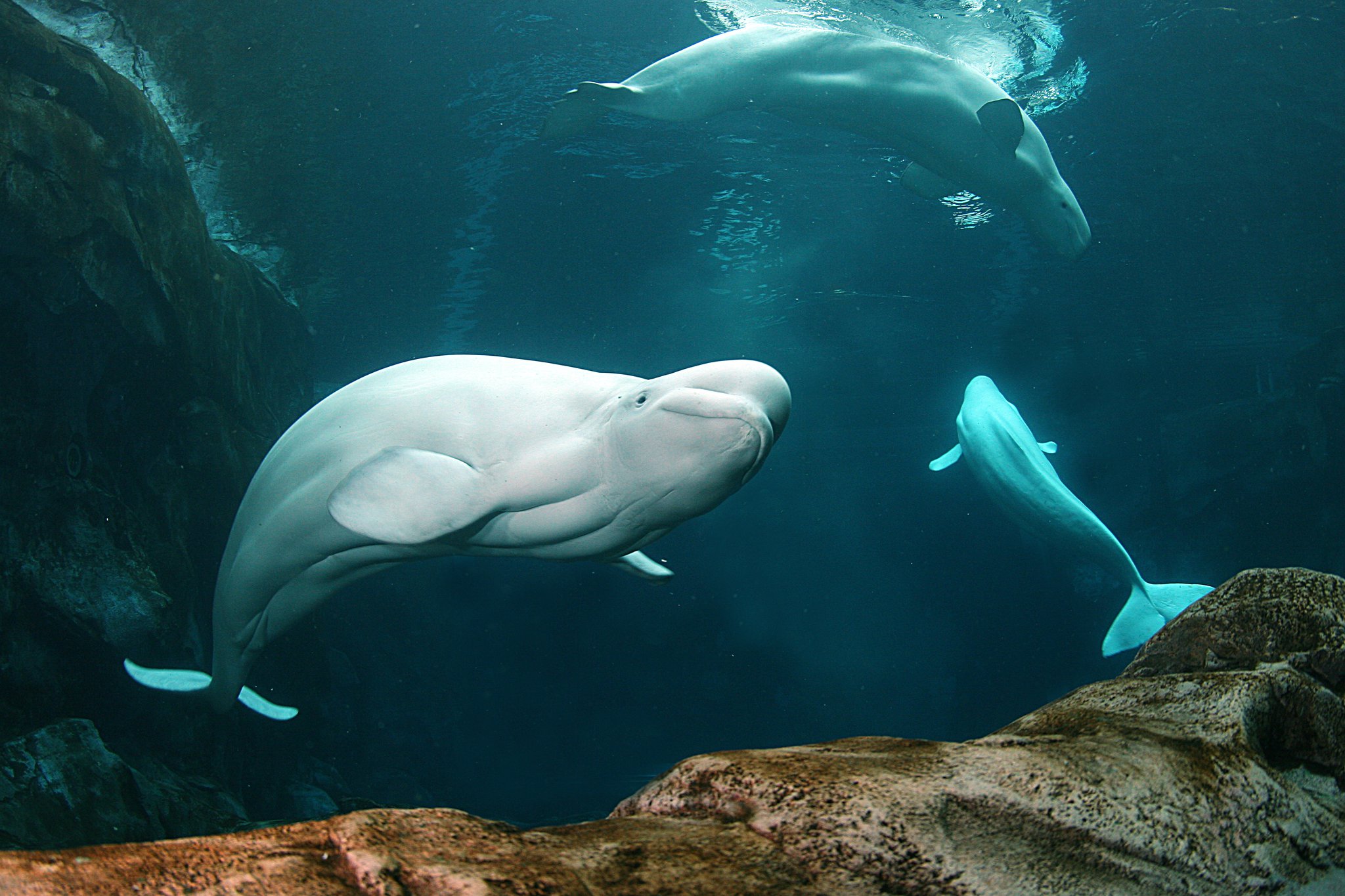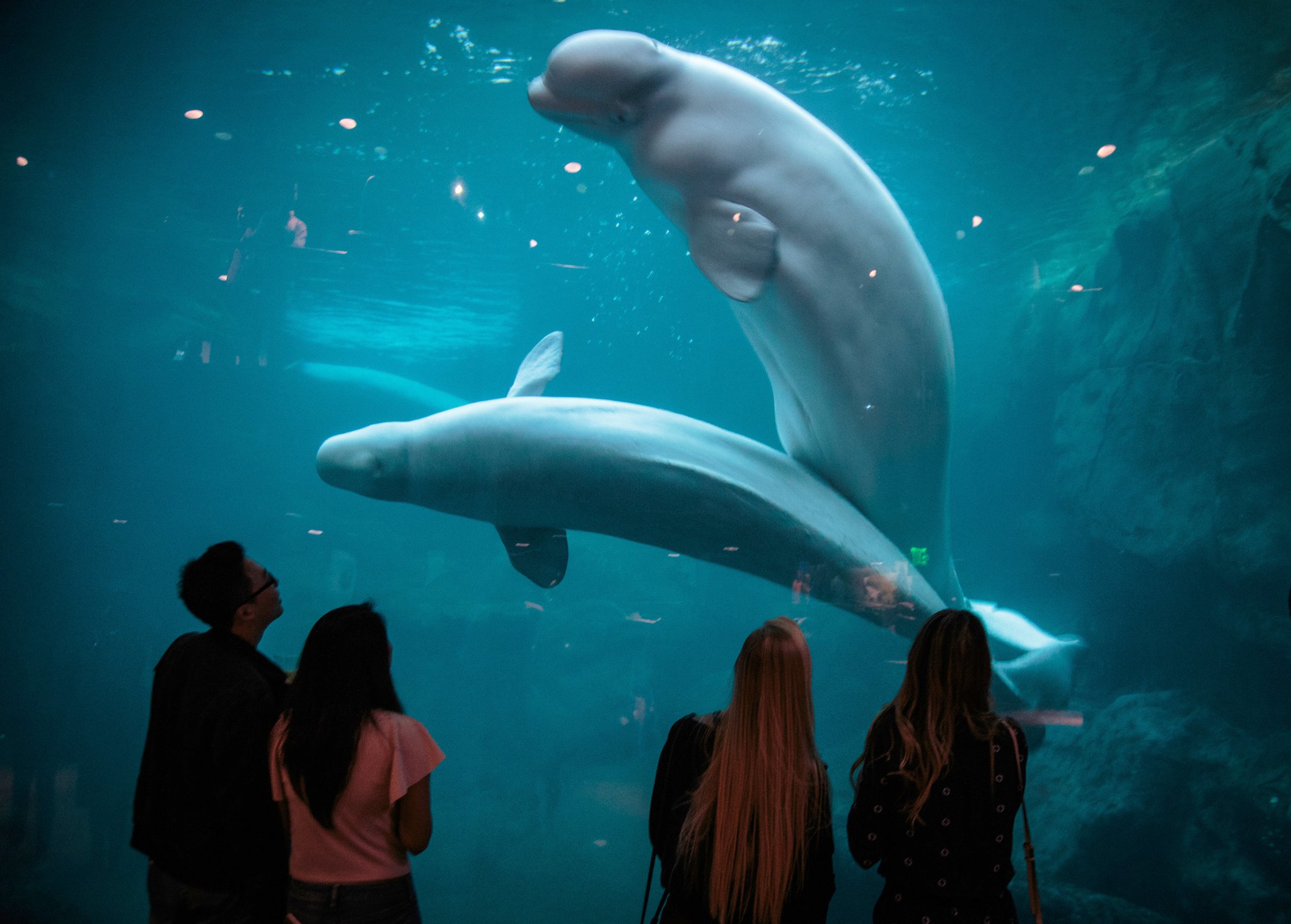Beluga whales have always been a captivating subject for marine enthusiasts, and their presence in aquariums has sparked both admiration and controversy. If you’ve ever wondered about the life of these majestic creatures and how aquariums play a role in their conservation, you’re in the right place. This article dives deep into the fascinating world of beluga whales and explores their life in aquariums, offering insights you won’t find anywhere else.
Now, let’s face it—beluga whales are like the rockstars of the ocean. With their adorable expressions, playful behavior, and unique white skin, they’ve captured the hearts of millions around the globe. But what happens when these sea giants find themselves in aquariums? Is it a blessing or a curse? We’ll break it down for you.
Our journey today will take us through the ins and outs of beluga whales in aquarium settings. From their biology to the ethical debates surrounding their captivity, we’ll cover it all. So, buckle up and let’s dive into the deep blue sea of knowledge!
Read also:Twinkie The Parrot The Feathered Star Who Stole The Internets Heart
Why Are Beluga Whales So Special?
Beluga whales, often referred to as “sea canaries,” are unlike any other marine mammal. They’re known for their incredible vocalizations, which include clicks, whistles, and chirps. These sounds aren’t just random noises; they’re part of an intricate communication system that helps them navigate, hunt, and socialize. Imagine having your own personal GPS system built into your body—that’s what it’s like for a beluga whale!
Unique Physical Characteristics
Let’s talk about what makes beluga whales stand out physically. First off, their pure white skin is a dead giveaway. Unlike their darker cousins, belugas have this stunning white hue that sets them apart. But here’s the kicker—they’re not born white! Baby belugas, called calves, are actually born gray and gradually turn white as they age. Talk about a fashion transformation!
Another cool fact? Beluga whales can move their heads independently of their bodies. Most whales have fused neck vertebrae, but not our friends here. This flexibility allows them to look around without turning their entire body, making them incredibly agile hunters.
Beluga Whale Ga Aquarium: A Closer Look
Now, let’s shift our focus to aquariums. While some people argue that keeping belugas in captivity is unethical, others believe it plays a crucial role in education and conservation. So, what’s the deal with beluga whale ga aquarium? Let’s break it down.
Conservation Efforts
Aquariums often highlight their role in conserving species like the beluga whale. By studying these animals up close, scientists can gain valuable insights into their behavior, health, and reproduction. This knowledge can then be used to protect wild populations and ensure their survival for future generations.
For instance, did you know that some aquariums participate in breeding programs? These programs aim to increase the population of endangered species, including belugas. While it’s not a perfect solution, it’s certainly a step in the right direction.
Read also:Kourtni Smith Maryland Obituary A Heartfelt Tribute To A Beloved Soul
The Ethical Debate Surrounding Beluga Whale Ga Aquarium
Of course, no discussion about beluga whales in aquariums would be complete without addressing the ethical concerns. Many animal rights activists argue that keeping such intelligent and social creatures in captivity is cruel. They believe that belugas should roam free in their natural habitats, not confined to tanks.
Arguments For and Against
On one hand, supporters of aquariums argue that they provide a safe environment for belugas, free from predators and pollution. They also claim that aquariums educate the public about marine life and inspire people to care about conservation.
On the other hand, critics point out that no tank, no matter how large, can replicate the vastness of the ocean. Belugas in captivity may suffer from stress, boredom, and health issues due to the unnatural conditions. It’s a tough pill to swallow, but it’s something we need to consider.
Life in Captivity: What’s It Like for Beluga Whales?
So, what’s life really like for beluga whales in aquariums? Let’s take a closer look at their daily routines, social interactions, and overall well-being.
Daily Routine
In aquariums, belugas typically follow a structured daily routine. They receive regular meals, participate in training sessions, and engage in enrichment activities designed to stimulate their minds. While this may sound ideal, some experts worry that it doesn’t fully meet their complex needs.
Social interactions are also important for belugas, as they’re highly social animals. In the wild, they live in pods and communicate constantly with each other. In aquariums, however, their social circles are often limited, which can lead to loneliness and frustration.
The Role of Technology in Beluga Whale Ga Aquarium
Technology has played a significant role in improving the lives of beluga whales in aquariums. From advanced filtration systems to state-of-the-art medical equipment, modern advancements have made it possible to provide better care for these magnificent creatures.
Innovations in Care
One example of such innovation is the use of underwater cameras to monitor belugas’ behavior. These cameras allow trainers and scientists to observe the whales without disturbing them, providing valuable insights into their natural behaviors.
Another exciting development is the use of virtual reality to simulate the ocean environment. By creating immersive experiences, aquariums can offer belugas a taste of their natural habitat, even if they’re miles away from the sea.
Beluga Whale Ga Aquarium: The Science Behind It
Let’s dive into the science behind keeping beluga whales in aquariums. What does it take to create a suitable environment for these creatures, and how do scientists ensure their well-being?
Environmental Requirements
Belugas require specific environmental conditions to thrive. The water temperature, salinity, and quality must all be carefully monitored and maintained. Additionally, the tanks must be large enough to allow for swimming and socializing, with features that mimic their natural habitat.
Scientists also study the nutritional needs of belugas to ensure they receive a balanced diet. This includes a variety of fish and other seafood, as well as supplements to support their health.
Conservation Success Stories
Despite the challenges, there are some success stories when it comes to beluga whale ga aquarium conservation efforts. Let’s take a look at a few examples.
Case Study: The Vancouver Aquarium
The Vancouver Aquarium has been at the forefront of beluga whale research and conservation for decades. Through their work, they’ve made significant contributions to our understanding of these animals and helped protect wild populations.
For example, the aquarium has developed cutting-edge techniques for studying beluga vocalizations, which has led to new insights into their communication systems. They’ve also collaborated with other organizations to monitor beluga populations in the wild and address threats such as climate change and pollution.
Beluga Whale Ga Aquarium: The Future
As we look to the future, what does it hold for beluga whales in aquariums? Will we see more innovative solutions to address the ethical concerns, or will the debate continue to rage on?
Potential Developments
One potential development is the creation of sea sanctuaries, where belugas can live in a more natural environment while still receiving the care and protection they need. These sanctuaries would provide a compromise between captivity and freedom, offering the best of both worlds.
Another possibility is the continued advancement of technology, which could revolutionize the way we care for belugas in aquariums. From robotic companions to virtual reality simulations, the future holds endless possibilities for improving the lives of these incredible creatures.
Conclusion
In conclusion, the world of beluga whale ga aquarium is complex and multifaceted. While there are valid concerns about captivity, there are also undeniable benefits to be gained from studying and caring for these animals. By striking a balance between education, conservation, and ethical considerations, we can ensure a brighter future for beluga whales both in aquariums and in the wild.
We encourage you to share your thoughts and opinions in the comments below. Do you think beluga whales belong in aquariums, or should they be left to roam free in the ocean? Whatever your stance, we hope this article has provided you with valuable insights and food for thought.
And don’t forget to explore more articles on our site for all things marine life. There’s always more to discover, and we’re here to guide you every step of the way!
Here’s a quick recap of what we’ve covered:
- Beluga whales are unique and fascinating creatures with incredible vocalization abilities.
- Aquariums play a role in conservation and education, but ethical concerns remain.
- Technology is advancing the way we care for belugas in captivity.
- Success stories and potential developments offer hope for the future.
Remember, every action we take today can make a difference for generations to come. Let’s work together to protect these incredible animals and ensure their survival for years to come.
Table of Contents
- Why Are Beluga Whales So Special?
- Beluga Whale Ga Aquarium: A Closer Look
- The Ethical Debate Surrounding Beluga Whale Ga Aquarium
- Life in Captivity: What’s It Like for Beluga Whales?
- The Role of Technology in Beluga Whale Ga Aquarium
- Beluga Whale Ga Aquarium: The Science Behind It
- Conservation Success Stories
- Beluga Whale Ga Aquarium: The Future
- Conclusion


